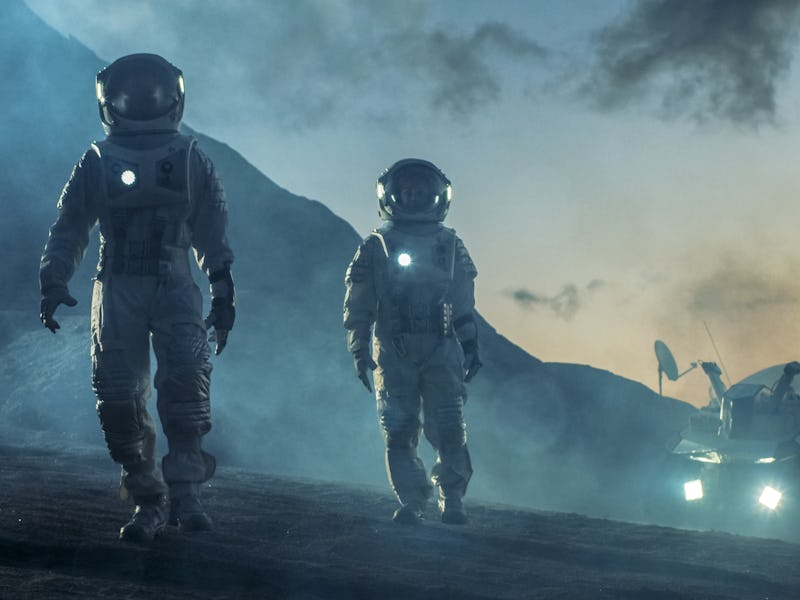7 books about the possible future of space colonization
We only recommend products we love and that we think you will, too. We may receive a portion of sales from products purchased from this article.

Before space became a setting for human exploration and profit, it was a setting of the imagination. The relationship between science and science fiction has never been clearer than when it comes to the final frontier. With the Moon hanging over humanity for as long the species has been in existence, inspiration has been easy to come by. It often feels like the science fiction writers of generations passed laid down markers that modern-day technology is still trying to reach.
Perhaps chief among these strivers is Elon Musk, who has been very open about wanting to build a city on Mars. Here are some books that have explored planetary colonization, with both negative and positive results, that Musk (or anyone else) could learn from.
Red Mars, by Kim Stanley Robinson. Published in 1992, as the Cold War was coming to an end, Red Mars is perhaps the definitive exploration of space colonization. The book is able to balance its detailed descriptions of colonization with rich characters who challenge each other’s perceptions and ideas. The characters deal with everything from immigration to naturalism when discussing their plans for the planet. Does Mars remain a vassal for Earth’s governments to exploit, or should the planet attempt independence? Robinson treats his characters with respect and shows how no detail is too small to change the course of human history.
The Word for World is Forest, by Ursula K. LeGuin. “Earth was a tamed planet and New Tahiti wasn’t. That’s what he was there for: to tame it.” The ‘he’ here refers to Don Davidson, one of the angriest protagonists in LeGuin’s “Hainish” cycle of books, which deal with humanity exploring the galaxy. Written during the Vietnam War, LeGuin’s humans are loggers, destroying the world of the Athsheans. When the Athsheans strike back, it’s easy to side against the vicious Davidson, but LeGuin shows that there are no innocents in conflict. While many of the themes in Forest were later seen in James Cameron’s Avatar, LeGuin was disgusted by the twisting of her story to show violence as a force for good. Stick with the original.
Alphanauts, by C. Brian Clarke. “The three-year quarantine was over.” A shockingly prescient sentence opens Clarke’s 2012 novel, and what follows is equally fascinating. Astronauts have been quarantining at the end of their years-long journey to and from Alpha Centauri, where they were exploring an Earth-like planet. But when they arrive back at Earth, they discover to their dismay that they’ve all contracted a virus which will make their living on Earth impossible. They’re forced to travel all the way back to Alpha Centauri, where they find more life than they suspected.
The Book of Strange New Things, by Michael Faber. Space means the unknown, and the unknown can be a place to examine the big questions of humanity. Faber looks sternly at religion in Strange New Things: the book’s protagonist is a Christian missionary, Peter, sent to live on an alien world called Oasis and convert the beings there to Christianity. To his surprise, the work is a breeze: the aliens rename themselves Jesus Lover One, Two, Three, and so on. But as Peter’s marriage starts to fall apart, he begins to question his mission. And he begins to understand the reason that Oasis has so quickly accepted his preaching.
Leviathan Awakes, by James S. A. Corey. Better known today for the sci-fi series on which its based, The Expanse, Leviathan Awakes takes place in a deeply developed solar system where Earth and Mars are major, competing powers, and stuck in between them are the blue-collar belters who have to deal with light gravity, abusive corporations, and, as the series begins to reveal, vast, planetwide conspiracies.
Coyote, by Allen Steele. Sci-fi is often split into two demeanors: there are optimistic utopias, and then there are the gritty dystopias. Coyote strikes a balance between the two, showcasing the dystopian United Republic of America where the Liberty Bell is on lockdown and there’s only one star on the flag. As the URA prepares to colonize a habitable moon colloquially known as Coyote, political dissidents hijack the shame and head to the moon not to further the URA’s mission, but to start something new.
Artemis, by Andy Weir. After dipping his toe into planet colonization in his runaway hit The Martian, Weir jumps into the deep end with his realization of the lunar city, Artemis. It’s not a great place to live: there are narrow hallways instead of streets, your job is dependent on the type of spacesuit you can afford. With part-timer porter and part-time crook Jazz Bashara guides readers through a city built for tourism and kept up by a nearly invisible working class.